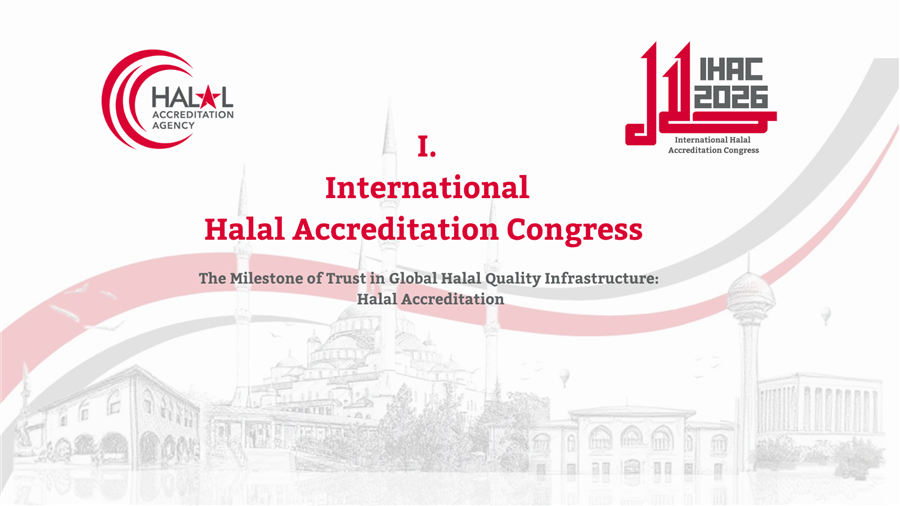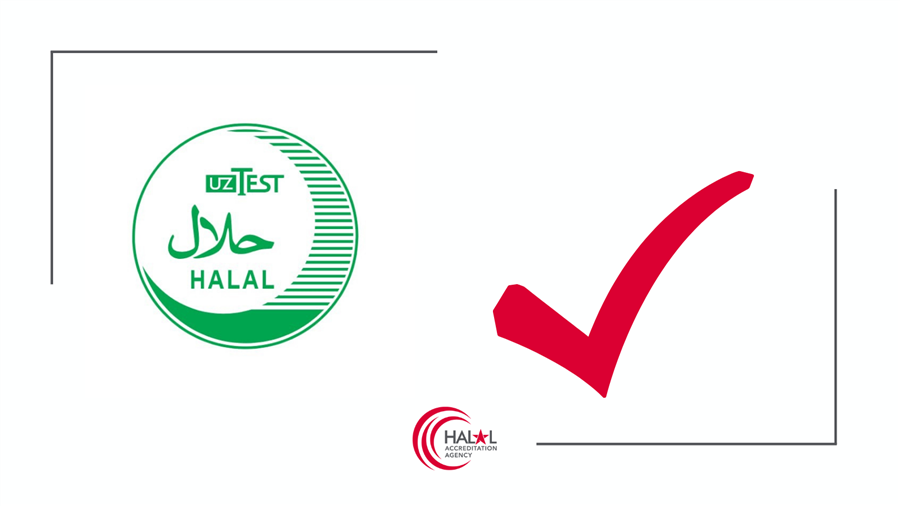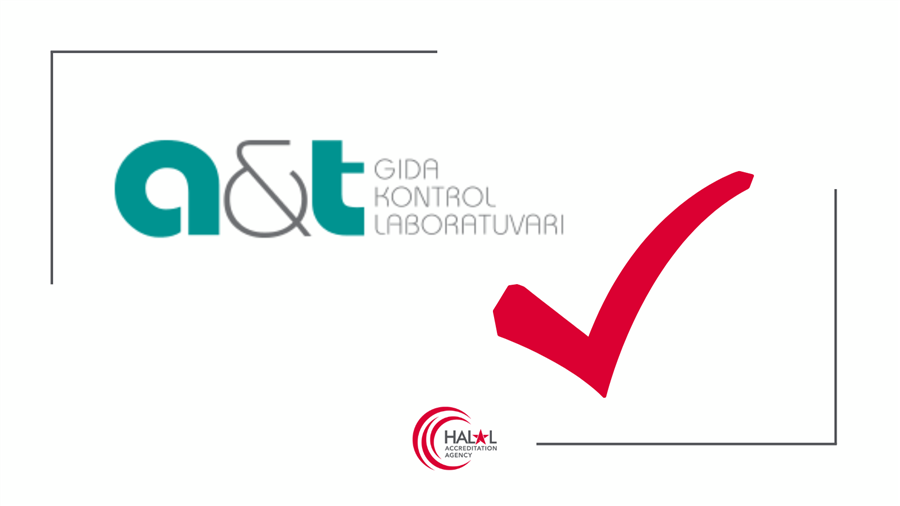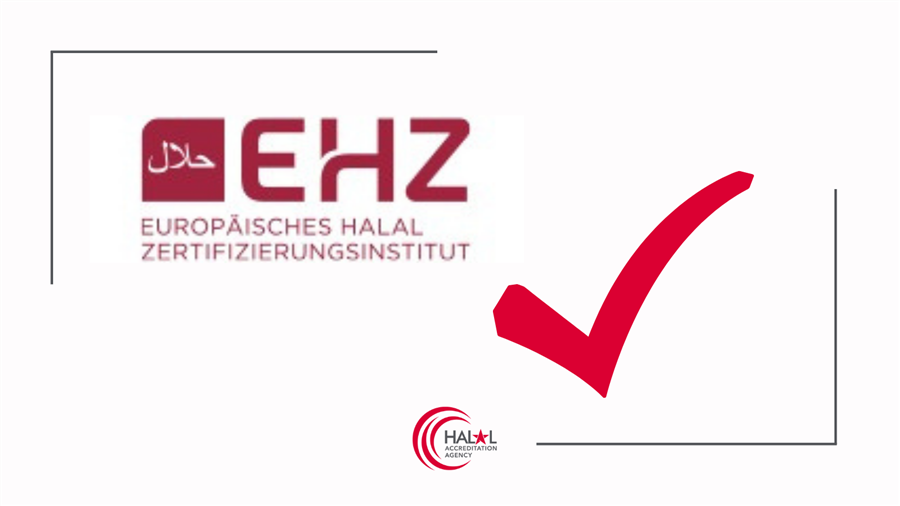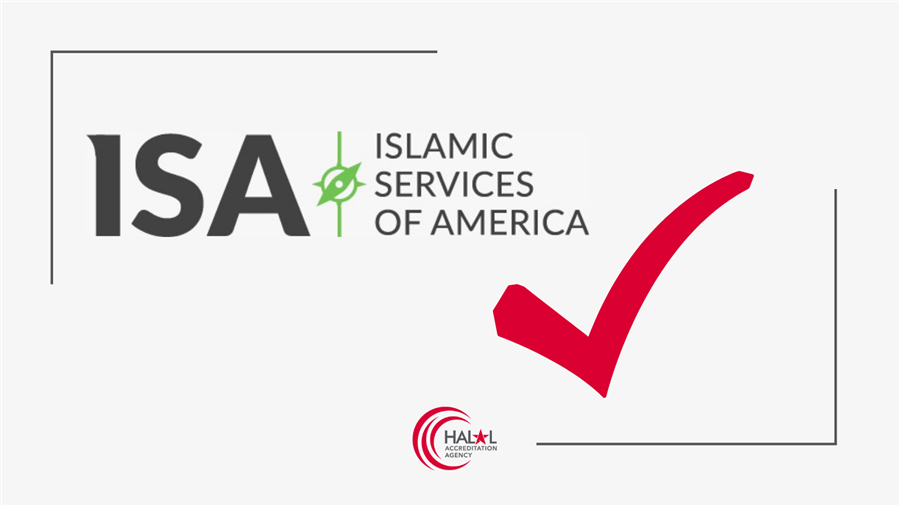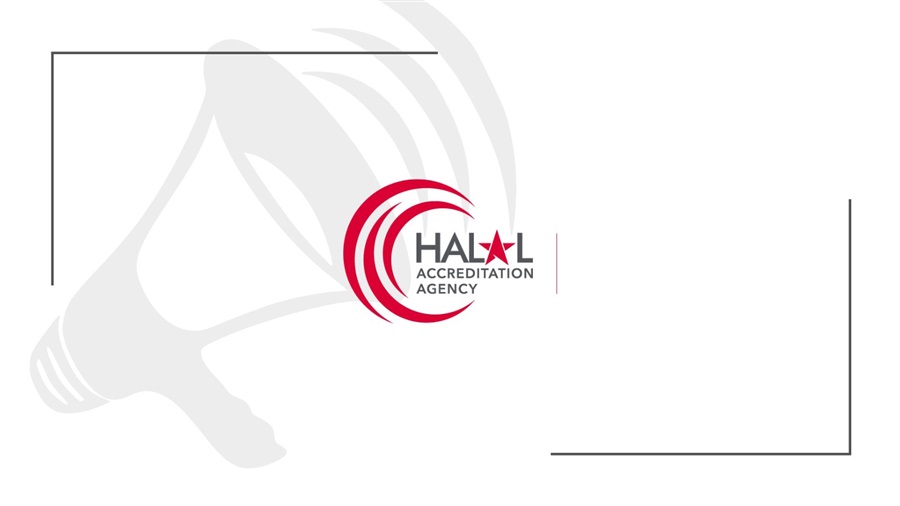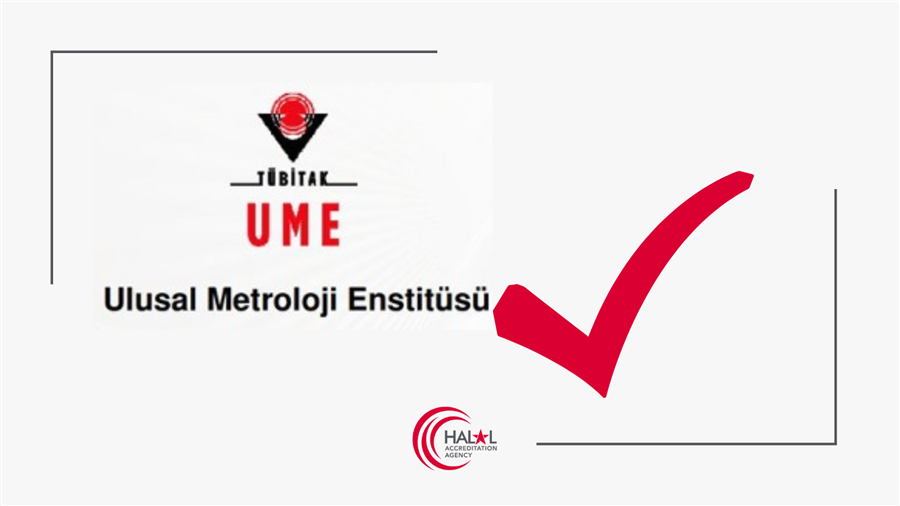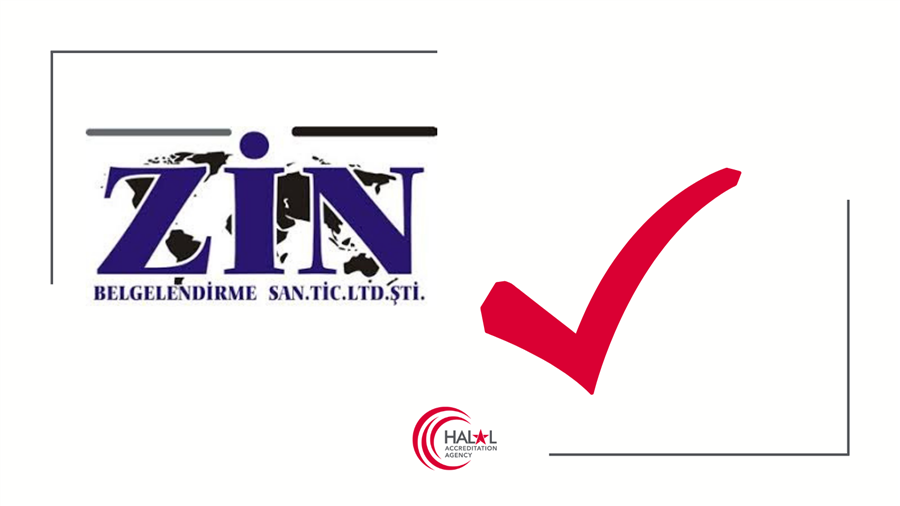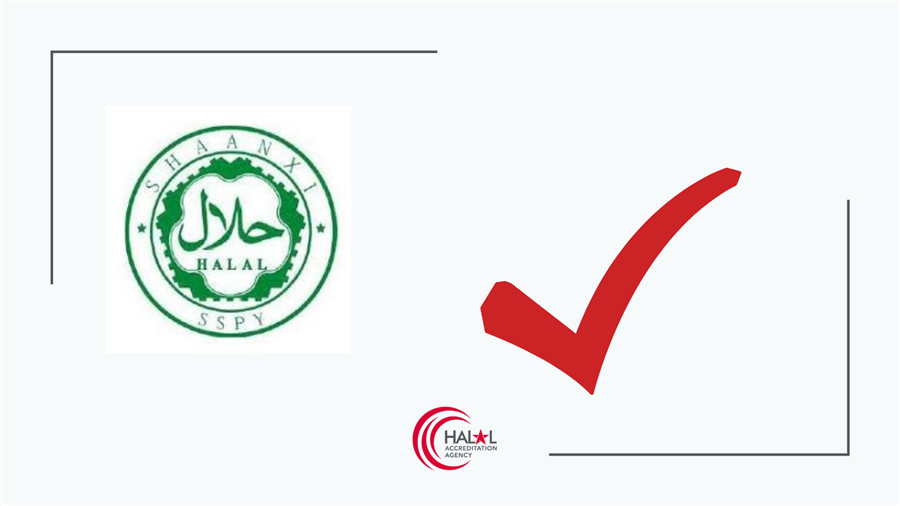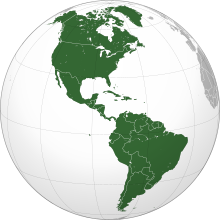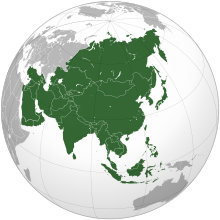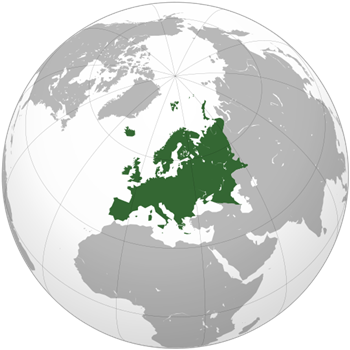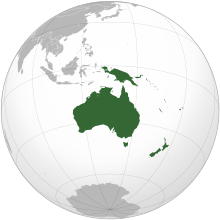- CERTIFICATION
- FINANCE
- FOOD
- TOURISM
- TEXTILE
- COSMETICS
Event Calendar
- FAIR
- CONFERENCE
Announcements
- 03 Kasım 2025 Pazartesi
1st International Halal Accreditation Congress (6-8 April 2026)
- 20 Ocak 2025 Pazartesi
IMPORTANT ANNOUNCEMENT: A Revision in HAK’s Key Mandatory Document- New Requirements for HCABs
- 08 Ocak 2025 Çarşamba
HAK Academy 2025 training agenda has been announced
- 19 Şubat 2021 Cuma
Cooperation agreement has been signed between Turkey and Azerbaijan in the field of halal accreditation
- 03 Aralık 2019 Salı
HAKSIS - Halal Accreditation System

FrequentlyAskedQuestions
1. What is Accreditation and Halal Accreditation?
According to ISO/IEC 17011 Standard, accreditation is defined as a third-party attestation related to a conformity assessment body conveying formal demonstration of its competence to carry out specific conformity assessment tasks. Accreditation also refers to the public activity regarding the determination and official acceptance of a conformity assessment body by a national accreditation body that it meets the requirements set by the relevant national or international standards and, where applicable, the additional requirements stipulated in the relevant sectoral regulations in order to carry out a certain conformity assessment activity.Halal accreditation is the evaluation, confirmation of competencies, regular inspection and observation of institutions that performs in the field of halal conformity assessment, in other words, institutions issuing halal certificates, according to nationally and internationally accepted standards.
2. What is Conformity Assessment (Certification) and Who Carries Conformity Assessment Activities?
Conformity assessment refers to the process that indicates whether certain conditions regarding the product, process, service, system, person, or organization have been fulfilled. On the other hand, conformity assessment body refers to the organization that performs conformity assessment activities including calibration, experiment, certification, inspection, testing, verification, production of reference materials and provision of proficiency testing. In daily use, conformity assessment bodies are sometimes referred to as “certification bodies”.According to ISO/IEC 17011 Standard, a conformity assessment body is “a body that performs conformity assessment activities and that can be the object of accreditation”.
3. What are the Duties of the Halal Accreditation Agency (HAK)?
The HAK was established to accredit halal conformity assessment bodies, to ensure that these bodies operate according to national or international standards and thus confirm the national and international acceptance of the documents they issue.Within this framework, the duties of the HAK in accordance with Presidential Decree No. 4 are; to provide halal accreditation services to halal conformity assessment bodies located both in Turkey and abroad, to determine and apply the criteria and measures related to halal accreditation, to represent Turkey either in regional or international accreditation unions and organizations, to become members of them, to participate in their management or serve as their headquarters, to sign bilateral or multilateral mutual recognition agreements, to advance relations with the accreditation agencies or the bodies relevant to halal accreditation in the countries which do not have accreditation agencies, to cooperate, to conduct all types of scientific and technical researches about halal accreditation, to carry out activities increasing the importance of halal accreditation, to organize trainings and to conduct or get researches and publications in this context, to organize national or international congresses, seminars or similar meetings.
4. Which Other Institutions Can Provide Halal Accreditation in Turkey?
According to the Law No. 7060, the HAK is the only authorized institution to accredit halal conformity assessment bodies in Turkey. Therefore, no other real or legal person can operate in matters that fall within the scope of the HAK, accredit halal conformity assessment bodies and make a statement regarding the provision of services related directly or indirectly to halal accreditation.
5. Does the HAK Issue Halal Certificates?
No, the HAK does not issue halal certificates. Halal certification activity is not within the scope of the duty and authority of the HAK. Halal certificates are issued by conformity assessment (certification) bodies. Halal certification (conformity assessment) bodies are accredited by the HAK only after their activities are subjected to inspection and supervision. The certification bodies accredited by the HAK can be accessed on HAK’s website. (https://english.hak.gov.tr/halal-accreditation/accredited-cab-search)
6. Does the HAK Decide What is Halal or Not?
No. The HAK neither is a fatwa authority nor decides what is halal or not. The HAK claims to serve the purpose of establishing a structure that is reliable and well-known in world-wide as well as has high awareness in the eyes of consumers by accrediting the halal conformity assessment bodies (granting them the necessary permissions and assessing them to issue certificates) that operate in accordance with the related standards and issue halal certificates.
7. Are the Products or Services that do not have Halal Certificates Considered Non-Halal?
According to Islamic jurisprudence, halal means lawful, permitted or non-prohibited. This definition includes the compliance with the criteria for health and hygiene (being tayyiban) in food and other products. In this respect, the certification by halal certification bodies accredited by the HAK comprises the requirements of internationally accepted standards for food safety, hygiene and health in addition to compliance with Islamic rules. However, it should not be concluded that the product which does not own a halal certificate will be deemed non-halal, and such a product must be known as ‘not having a halal certificate’.
8. Against Which Standards does the HAK Provide Accreditation?
The HAK provides accreditation through the OIC/SMIIC standards, which are prepared by the Standards and Metrology Institute for the Islamic Countries (SMIIC), an affiliated body of the Organization of Islamic Cooperation (OIC) of which Turkey is a member since its establishment. The standards issued in several fields by the SMIIC can be accessed on its official website. (https://www.smiic.org/en/standards)
9. What is the SMIIC? Why the OIC/SMIIC Standards are Preferred by the HAK?
The SMIIC was established in 2010 with the aim of eliminating technical barriers and developing trade between the member countries through harmonization of standards in the member countries of the OIC and preparation of new ones. It is open to all OIC members. Its headquarters is in Istanbul. It has currently 46 members, 3 of whom are observers.SMIIC issues standards specific to goods and service sectors such as food, cosmetics and tourism, as well as standards for laboratories and staff certification. These standards can be accessed on SMIICs official website. (https://www.smiic.org/en/standards).SMIIC standard preparation and revision studies are already continuing in different areas. These standards have been prepared by the sub-commissions composed of the representatives from the member countries. Since the units called the Technical Committees, in which the preparation studies of the standards are carried out and the decisions are taken unanimously, are open to the participation of all SMIIC member countries, standards that can meet the sensitivities of all Muslims in the world are being constituted. Furthermore, SMIIC also takes into account the globally accepted International Standards Organization (ISO) standards, and it has often made references to ISO standards in preparation of the halal certification standards.
10- In Which Areas Does the HAK Provide Accreditation Services?
The HAK generally provides accreditation services for organizations that certify products and services as halal, but also operates in additional conformity assessment areas covered by OIC/SMIIC. In this context, the HAK has implemented halal accreditation programs for conformity assessment bodies that comply with SMIIC standards in the framework of management and operation in terms of especially in food, cosmetics product groups as well as in the service sector such as tourism and personnel, and for laboratories that carry out experimental activities in the sphere of halal.
11. How are the Accreditation Application and Assessment Processes for Halal Certification Bodies?
Rules and procedures stated in the “Regulation on the Accreditation of Halal Conformity Assessment Bodies” published in the Official Gazette No. 30920 of October 16, 2019 are the basis for accreditation of conformity assessment bodies carrying out halal certification activities. Besides, all application guides and basic guidelines that define halal accreditation procedures and principles can be accessed through our website (www.english.hak.gov.tr). An organization applying for accreditation to the HAK is subject to processes such as document and information confirmation and field assessment consisted of office and witness assessment. Likewise, once the applicant halal conformity assessment body is granted with an accreditation certificate, there are also regular surveillance assessments at least once a year. HAK uses a competent infrastructure in the process of evaluating the applications received and implements transparent and foreseeable procedures within the framework of the "Corporate Impartiality Policy". Furthermore, the members of the Board of Directors and the staff of the HAK all adhere to objectivity, impartiality and confidentiality principles.
12. Who may join in the Assessor Pool of the HAK?
The persons who will take charge in the HAK’s accreditation assessments must be able to meet both the minimum requirements set out in OIC/SMIIC standards and the requirements of the principles adopted by the HAK. If needed, the HAK can announce a formation of a pool of assessors and technical/Islamic experts through its official website. Candidates who meet the necessary requirements can apply to the HAK by providing the information requested completely.The persons who can take part in the assessor/expert pool should be received the trainings of and capable of interpreting the most current versions of ISO/IEC 17021-1, ISO/IEC 17024, ISO/IEC 17025 and ISO/IEC 17065 standards, as well as the OIC/SMIIC standards that the HAK uses as base.The personal and technical qualifications of the persons who will be in the pool are clearly defined in the related documents of the HAK. Applicants are required to meet the requirements specified in these documents, which are also available on official website of the HAK.
13. What is the Importance and Advantage of Being Accredited by the HAK?
Halal certificates issued by the certification bodies accredited by the HAK gain significant prestige by proving their reliability in accordance with OIC/SMIIC standards, the standard of the Organization of Islamic Cooperation. Thus, circulation of products having consumer confidence is ensured in the market, and ease of entrance to international market is achieved. Additionally, halal certificates issued by accredited certification bodies from the HAK can benefit from various domestic and also export-related supports. Only the halal certificates issued by the institutions/organizations accredited by the HAK are evaluated within the scope of certification support regarding exportation, as stated in the “Supported Market Entry Documents” list located in the appendix of “Decision on Supporting Market Entry Documents” No. 2014/8 of the Ministry of Trade. Within the framework of Business Development Support Program of Small and Medium Enterprises Development Organization of Turkey (KOSGEB), certificates to be acquired from the HAK and institutions/organizations accredited by the HAK can benefit from KOSGEB support.








